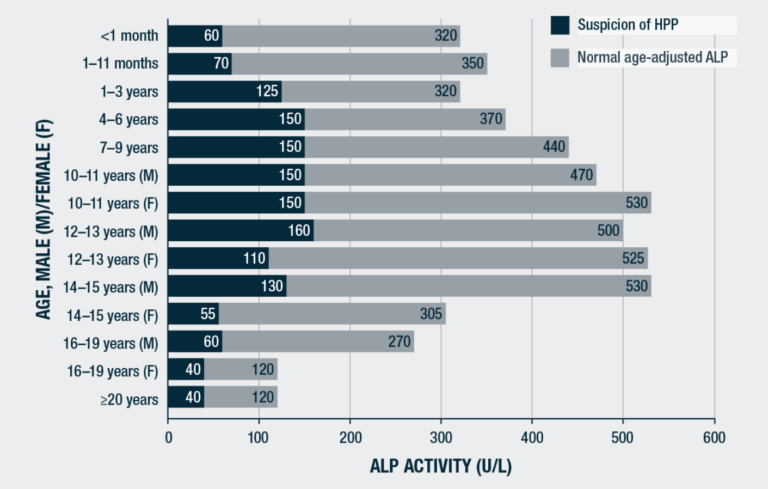Low ALP, Could it be HPP?
If you received laboratory results that indicate low ALP, you are probably wondering what that means.
ALP stands for alkaline phosphatase, an enzyme produced mostly in the liver and bones and found circulating throughout the body. You might have gotten an ALP test as part of a blood-test bundle such as the comprehensive metabolic panel or liver function panel.
Normal blood ALP levels vary between patients based upon age and gender. ALP levels fluctuate throughout life. Normal levels in adolescence & pregnancy skew higher. ALP can also be elevated in the event of a bone fracture.

 Low ALP is Rare
Low ALP is Rare
It wouldn’t be unusual for a doctor to disregard a low ALP result. But if you have low ALP, you should be aware that in some people it is a sign of hypophosphatasia—HPP—a rare disease that affects bones and teeth.
People with HPP have soft, fragile bones that fracture easily and heal slowly. They also tend to lose baby teeth prematurely and can have skeletal deformities such as bowed legs. The severity of HPP varies widely, from no or mild symptoms to life-threatening. Other signs and symptoms that, along with low ALP, may point to a diagnosis of HPP include:
- Failure to thrive (in infants)
- Short stature
- Bone and joint pain
- Missed gross motor milestones (standing, sitting, crawling, turning over)
- Misshapen head, caused by craniosynostosis or chiari malformation
- Brain fog
HPP is sometimes mistakenly diagnosed as fibromyalgia, arthritis, or osteoporosis.
 Next Steps if You Have Low ALP
Next Steps if You Have Low ALP
If you have a lab result that shows low ALP, it is important to rule out HPP. Your doctor may run additional tests, such as:
- Bone x-rays
- ALP (to reconfirm)
- Vitamin B6 (Indicator: a too-high level)
- PEA (Indicator: excess urinary excretion of phosphoethanolamine)
- PLP (Indicator: increased level of blood pyridoxal 5’-phosphate)
- Genetic testing

